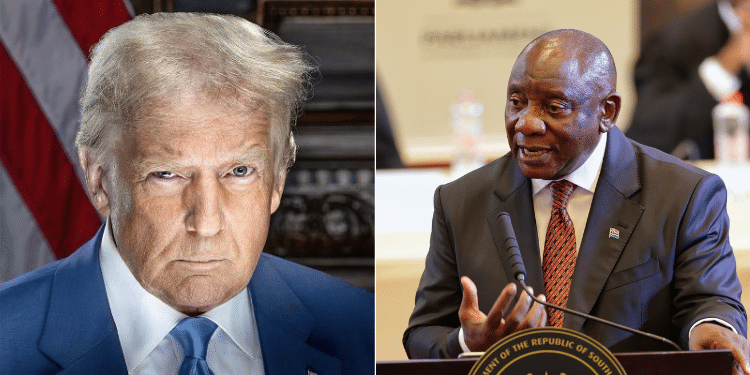U.S. President Donald Trump has signed an executive order cutting hundreds of millions of dollars in U.S. financial assistance to South Africa.
Released by the White House on Friday, February 7, the order cited a South African law that took effect in 2024 on land expropriation, the country’s genocide case at the International Court of Justice (ICJ) against Israel, and its move to reinvigorate relations with Iran.
The order said South Africa’s new law seizes the agricultural property of ethnic minority Afrikaners without compensating them. Afrikaners are mostly white descendants of early Dutch and French settlers.
However, the order didn’t elaborate on South Africa’s ties to Iran except to say that they were reinvigorated to develop commercial, military, and nuclear arrangements.
“In addition, South Africa has taken aggressive positions towards the United States and its allies, including accusing Israel, not Hamas, of genocide in the International Court of Justice, and reinvigorating its relations with Iran to develop commercial, military, and nuclear arrangements,” part of Trump’s order reads in part.
“The United States cannot support the government of South Africa’s commission of rights violations in its country or its undermining United States foreign policy, which poses national security threats to our Nation, our allies, our African partners, and our interests.”

The most recent U.S. government data shows that the country allocated nearly $440 million in assistance to South Africa in 2023.
Trump sanctions South Africa
However, the U.S. has declared that as long as South Africa continues with the practices that led to the sanctions, it shall not provide aid or assistance to the country.
Also Read: Ruto and Trump Aide on Phone Call Again
All executive departments and agencies (agencies), including the United States Agency for International Development (USAID), have to the maximum extent allowed by law, directed to halt foreign aid or assistance delivered or provided to South Africa, and to promptly exercise all available authorities and discretion to halt such aid or assistance.
“The head of each agency may permit the provision of any such foreign aid or assistance that, in the discretion of the relevant agency head, is necessary or appropriate,” the order adds.
Also, the order said the United States will promote the “resettlement of Afrikaner refugees escaping government-sponsored race-based discrimination, including racially discriminatory property confiscation.”
The Secretary of State and the Secretary of Homeland Security “shall take appropriate steps, consistent with law, to prioritize humanitarian relief, including admission and resettlement through the United States Refugee Admissions Program, for Afrikaners in South Africa.”
The order explained that such plan shall be submitted to the President through the Assistant to the President and Homeland Security Advisor.
President Trump signed the executive order after he complained about South Africa’s land policy.
On Sunday, he said that “South Africa is confiscating land” and “certain classes of people” are being treated “very badly” without citing evidence.
“South Africa is confiscating land, and treating certain classes of people VERY BADLY,” Trump said in a Truth Social post.
“The United States won’t stand for it, we will act. Also, I will be cutting off all future funding to South Africa until a full investigation of this situation has been completed!”
Ramaphosa responds
In addition, South African-born billionaire Elon Musk, whom Trump has named as his “efficiency czar,” has accused South Africa of having “openly racist ownership laws” and suggested white people were the victims.
Also Read: US Retracts Trump’s Order to Freeze Haiti Funding
President Cyril Ramaphosa defended South Africa’s land policy last week, saying the government had not confiscated any land and the policy was aimed at ensuring equitable public access to land.
“The recently adopted Expropriation Act is not a confiscation instrument, but a constitutionally mandated legal process that ensures public access to land in an equitable and just manner as guided by the constitution,” Ramaphosa said on X.
U.S. Secretary of State Marco Rubio said on February 5 cited the land policy in announcing that he will not attend a Group of 20 (G20) foreign ministers meeting later this month in South Africa.
The question of land ownership is politically charged in South Africa due to the dispossession of land from blacks during colonialism and apartheid.
According to the 2017 land audit, white landowners still own three-quarters of the country’s freehold farmland. This contrasts with 4 percent owned by black people, who make up 80 percent of the population.
Follow our WhatsApp Channel and join our WhatsApp Group for real-time news updates











































































